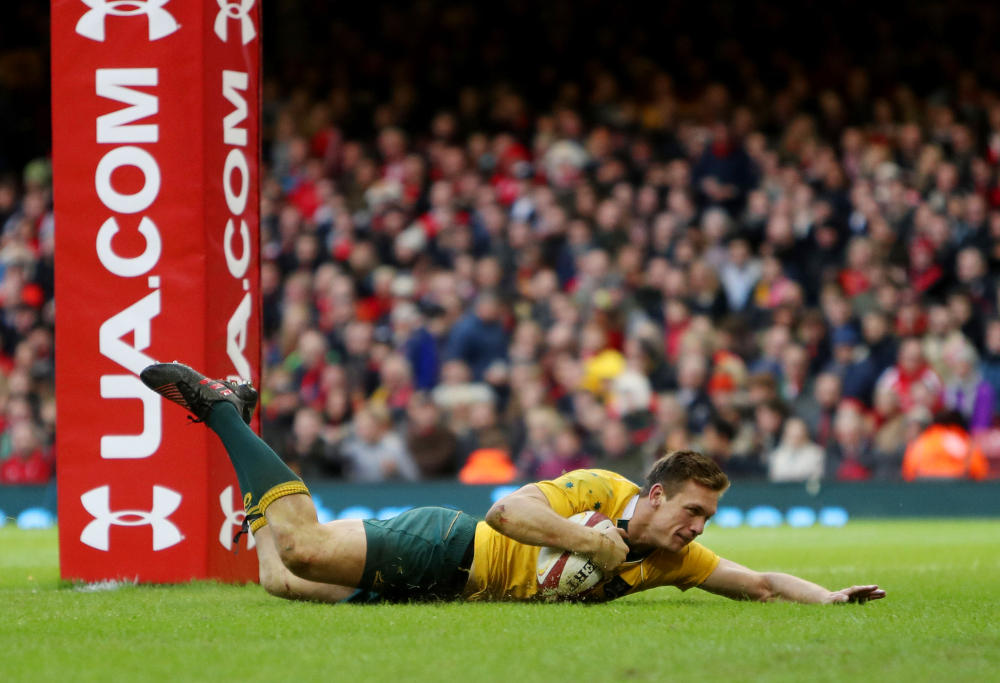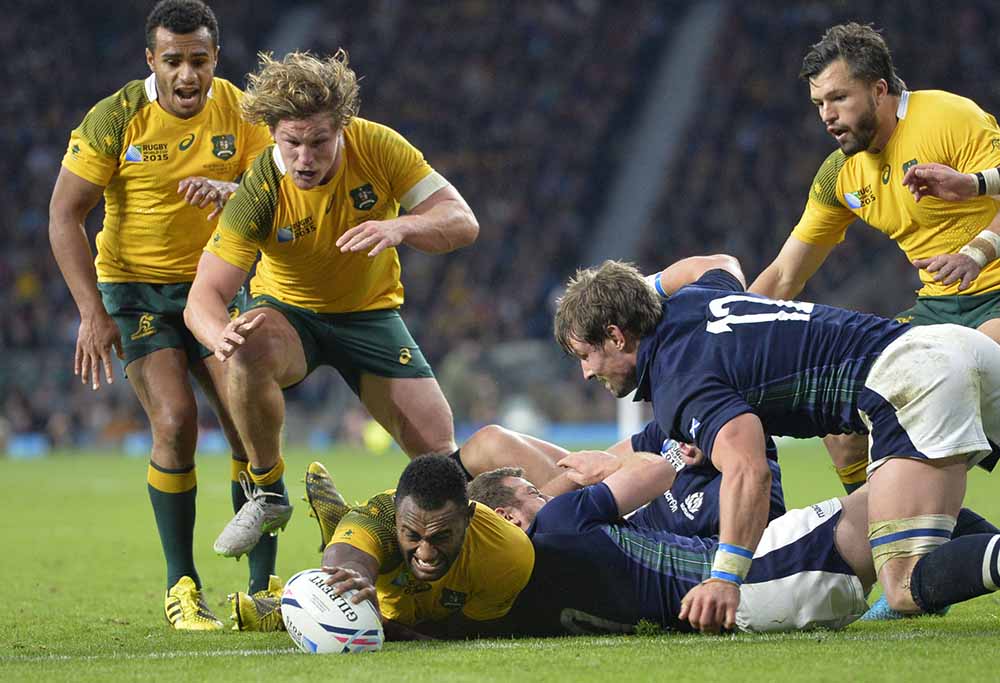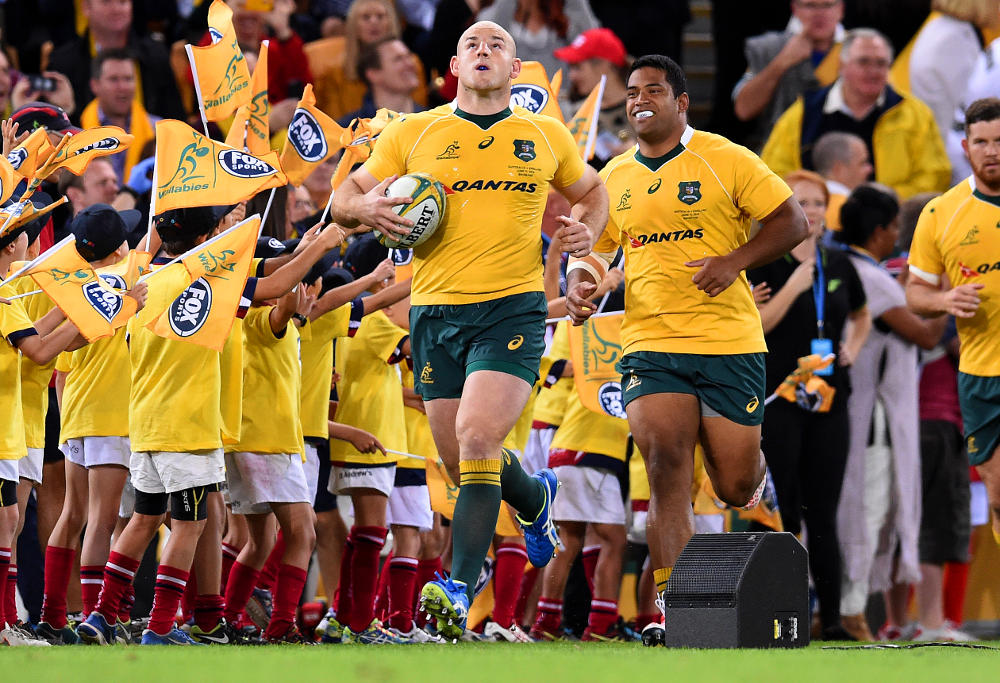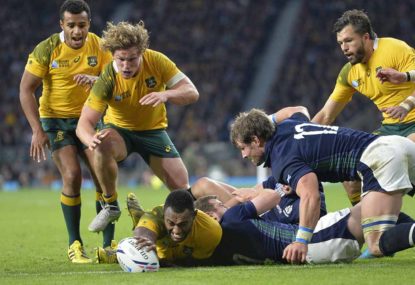Before the Wallabies’ tour of Europe, none of the pundits, me included, could see how they could win the Grand Slam, last achieved and for the only time in 1984. Now I see a way.
We (the pundits) couldn’t see a winning path through the succession of four Grand Slam Tests in five weeks starting with Wales and Scotland, then a non-Grand Slam Test with France, and culminating with the perceived toughest challenges with Ireland and England.
There was every chance, it was believed, that the Wallabies could lose to Wales first up (as Robbie Deans’ Wallabies did in their first Test of a Grand Slam challenge).
Or even Scotland, a bogey team of sorts for the Wallabies, before the real challengers presented themselves with Ireland, victors this year at Chicago over the All Blacks, and England at Fortress Twickenham.
England have been unbeaten in all their Tests this season, including a 3-0 whitewash of the Wallabies in Australia in June. And the thinking was that if the Wallabies got to Twickenham still unbeaten in their Grand Slam quest that this challenge would inevitably defeat them.
Now the Wallabies have won the first two Tests of the four-Test Grand Slam and with the quality of their play and the performances of their coming opponents we can see a path to Grand Slam glory that we couldn’t really perceive before the tour started.
Bear with me for a short discussion on the perils of prediction.
We start this discussion with the proposition that events have a way of making predictions seem rather foolish, even when the predictions seem to be rooted in reality.
And the corollary of this proposition is that once the unlikely happens it becomes all too obvious that it was not so unlikely in the first place.

The best current example to illustrate these truths is the way the US presidential election result confounded virtually all the polls and all the pundits.
What seemed obvious before the election was that there was no perceived route for Donald Trump to get to the 270 Electoral College votes needed to win the election. This can equate to the no perceived route to Grand Slam glory for the Wallabies.
Standing in the way of now President-Elect Trump (who could believe we would ever have to write these words) was the Blue (Democratic) Wall of the mid-western states, Wisconsin, Michigan and Pennsylvania (especially), that had not voted Republican for several decades.
Wisconsin was regarded as such a certainty for the Democrats that their candidate Hillary Clinton did not even bother to campaign there.
Now we know that these Blue Wall states contained seething masses of voters totally disenchanted with the Democrats. Equate these problems Ireland and England could be facing before they play the Wallabies.
The point here is that Ireland and England could be the rugby equivalents for the Wallabies’ Grand slam quest that the so-called Blue Wall was for presidential candidate Hillary Clinton.
The pundits could not see how the Blue Wall could ever be smashed. But after the presidential election, it became obvious that it was not a Blue Wall at all.
Now, thankfully getting back to rugby matters, we can see that defeating Ireland and England may not be such an impossibility as we imagined it might be before the Grand Slam tour began.
The first point to make in all of this is we can see the Wallabies had the good fortune of playing Wales and Scotland when they were playing their first Tests since June.
Wales were clearly off the pace against the Wallabies and were out of the Test by half-time after an onslaught from Michael Cheika’s men that had hallmarks of the All Blacks onslaughts against them earlier this season.
This weekend, playing their second Test of the November-December Test season, Wales came back from that thrashing by the Wallabies to win a tough victory against Argentina, 24-20, at the Millennium Stadium.
If Wales had played this Test before playing the Wallabies, they would certainly have been much more competitive than they were. And who knows what might have happened? Certainly, the fact that they had played their first Test since June the week before helped them tough out a victory against a fancied southern hemisphere power.
Scotland, too, were playing their first Test of the November-December series when they went down to the Wallabies on Sunday night (AEDT time) 22-23, after leading throughout the Test until the 75th minute of play.
I don’t doubt that if Scotland had played a Test last week (why on earth did they not do this?) they would have toughed out a victory against the Wallabies.
There were several aspects of their play that suggested that Scotland needed a Test under their belt to come out on top of the Wallabies.
First, they essentially ran out of energy after a brilliant first half where they led 17-10 and were given a standing, roaring ovation as they ran into the dressing room.
In the second half Scotland scored five points from a try, with Greig Laidlaw, Scotland’s captain, missing the conversion which would have clinched the game by “a coat of varnish.”
Second, Scotland lost the penalty count in the second half 8-4 when tiredness began to undermine the accuracy of their play in the scrums (where the Wallabies were dominant) and in the rucks (again where David Pocock had a field day).
Scotland’s coach Vern Cotter complained about Scotland not “getting the rub of the green” with the second half penalties and Laidlaw went further by complaining that Scotland “were harshly penalised on a few occasions.”
Scotland are becoming the whingeing Scots with their constant attacks on the referees. Their hostility to Craig Joubert after the Rugby World Cup 2015 quarter-final was one of the nastiest I have seen in years of covering rugby.

Scotland were not sanctioned by World Rugby, unfortunately. There have been many instances in the last couple of decades where Scotland have acted disgracefully towards its opponents and to officials. This nasty behaviour needs to be reined in, now, by World Rugby.
Third, Scotland were in possession of the ball for over three minutes in over-time when they launched phase after phase against the Wallabies and never once looked like making a breakthrough and, indeed, were pushed back about 20 metres by a strong Wallabies defensive effort.
I was struck, too, by the seeming lack of any plan by Scotland to set up a drop goal attempt. Scotland played the ball out wide on most of their attacking raids in these last desperate attacks and this made it impossible to establish the position in the middle of the field to launch a drop kick effort.
Even if they had forced a penalty, which they seemed to be playing for, it would have been a difficult kick for Laidlaw, an accurate but short-range kicked like Bernard Foley (who converted all his kicks, by the way), to belt over.
Again, I would assert that with this rustiness out of their system, Scotland will be an even tougher proposition for the next team that plays than they were in taking the Wallabies to the wire.
Now, to discuss the coming Tests against Ireland and England in connection with the Grand Slam assault.
Ireland were unimpressive in defeating Canada over the weekend. Admittedly, a number of their better, older players were rested for the return Test next weekend against the All Blacks.
The All Blacks also left out a number of their starters for their Test over the weekend against a youngish Italy. But the result, 68-10 to the All Blacks, suggested that Ireland with their historic, deserved victory at Chicago has poked the bear.
Italy had to concede ten tries to one and Ireland can expect a torrid time, win or lose at Dublin next weekend, against the raging, angry All Blacks.
And who does Ireland play the week after this torrid Test? The Wallabies.
I reckon that taking on the All Blacks twice in a couple of weeks will take an enormous amount of energy out of Ireland and also add some injuries to their starters. This can only help the Wallabies who will be fresher from an encounter with France in which some of their better players will be given a rest.
And England?
Eddie Jones side did defeat the Springboks 37-21 at Twickenham, with a scratch side.
But it was unimpressive, as Jones himself conceded. England conceded six penalties in the opening 20 minutes and were behind 9-7 when the Springboks’ young giant Eben Etzebeth had to leave the field after a head clash with Billy Vunipola. England scored a try from the next scrum and went on to monster a demoralised, out-played Springboks side.
My feeling is that England’s run of 11 successive Tests victories since the last their last pool match against Uruguay in the 2015 World Cup, and including ten wins out of ten under the coaching of Jones in 2016, will shortly come to an end.
England right now are nowhere near the 2003 World Cup-winning side coached by Clive Woodward that had a winning streak of 14 Tests.
The Springboks were criticised as being one of the worst South African sides ever to play at Twickenham. Even Jones concedes, “We are only starting to get there … we have to get better.”
Back to the Wallabies. Despite the close call in a terrific Test against, they are making dramatic improvements, on and off the field, already on this tour.
On the field, the set pieces are coming together quite well. Admittedly, the lineout was shaky once or twice but in general, with Stephen Moore playing out, as he should, the full 80 minutes, the set pieces were strong.

Especially in the first half, the Wallabies put together some dazzling set piece backline plays. And at the end of the Test, they put together some strong phases until Tevita Kuridrani burst through to score an excellent solo try to seal the victory.
With Israel Folau playing in the line on attack, the Wallabies employed a big-four-centres attack that Scotland found almost impossible to hold on several occasions. The potency of the Reece Hodge, Folau, Kuridrani and Dane Haylett-Petty (coming in from the wing) combination in the middle of the field is a work in progress.
But it showed enough to overwhelm Scotland from time to time. It already, however, provides the Wallabies with a firepower that is going to be difficult for Ireland and England to hold when everything comes together with the combination.
The greatest improvement to the Wallabies, though, is what is happening off the field. Michael Cheika is finally behaving and leading like a responsible head coach. This change is having a crucial effect on the performance, for the good, of the Wallabies on this Grand Slam tour.
Television shots throughout the Test showed the coaching box of the Wallabies with Stephen Larkham and Mick Bryne in the front row, peering into their laptops. Behind them at the back of the box was coach Cheika.
Cheika was calm, even when penalties went against the Wallabies and the television cameras turned on the Wallabies coaching box in the hope of an outburst from the coach.
At one point, Cheika sent some instructions out to the ground staff of the Wallabies. He was controlled in his behaviour and this transmitted itself to the players, especially the captain, Stephen Moore.
There were no displays of tantrums and rudeness from Moore towards the referee, a marked contrast to his behaviour earlier in the season.
And what would you know? The Wallabies won and deserved to win the penalty count in the crucial second half of the Test against Scotland.
I have been very critical of Cheika’s performance during and after Tests earlier in the season. It gave me no pleasure in pointing out that this behaviour was unacceptable for a national coach and was detrimental to the interests of the Wallabies.
Credit needs to be paid now to the reformed Cheika. His own personal reformation as a coach is leading to a reformation of the Wallabies as a winning Test side.
After the Test, the reformed Cheika put the boot into his team (and rightly so) for not having the “necessary focus” in the first half. The lack of line speed on defence was exposed right at the beginning of the Test as Scotland ran the ball at the Wallabies and found holes in the defensive line virtually every time they tested it.
The line speed was lacking, too, in the opening minutes of the second half when Scotland broke five tackles to put Jonny Gray over for a try.
But after that, especially in those crucial minutes at the end of the Test when Scotland were pressing for a score, any type of score, to win the Test, they were solid. This ability to regain composure and apply their proper defensive methods is a sign of the Wallabies maturing as a side.
Cheika, though, was rightly critical of Will Skelton for “his brain storm” at giving away a penalty and incurring a yellow card for a shoulder charge after the Wallabies had won a penalty near Scotland’s try line.
In the past, Cheika has been indulgent of stupid play like this. But he was right to call out Skelton for it and hopefully the lesson will be learnt.
Long may this new maturity of coach Cheika be maintained. For it is fundamental to the chances of the Wallabies pulling off their second Grand Slam triumph, an achievement that is becoming less impossible than it seemed to be two weeks ago.
































































































